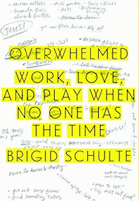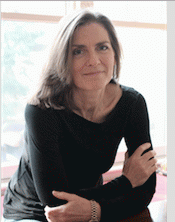Interview with Brigid Schulte, author of Overwhelmed: How to Work, Love and Play When No One Has the Time
My guest today is Brigid Schulte, Pulitzer Prize-winning journalist for The Washington Post and author of the New York Times bestseller, Overwhelmed: How to Work, Love and Play When No One Has the Time [Farrar, Straus and Giroux, 2014; Picador (paperback edition), 2015].
JB: Welcome to OpEdNews, Brigid. Why did you write this book?
BS: Hi, Joan. Thanks so much for inviting me to talk!
Overwhelmed, I have to say, was an accidental book. But I also have to say that it was a happy accident, and I'm grateful that I had the chance to write it. It opened my eyes and, in ways big and small, changed my life.
What happened was this: I was a crazy, fried, exhausted working mother of two young kids, and I was pretty typical: I didn't sleep enough. I worried I didn't work enough. I was consumed with guilt that I didn't spend enough time with my kids. I was burbling with low-level resentment for my husband that he seemed to "help out" every now and again when I asked, but that I was not only doing all the physical work of kids and housework, but all the mental labor of planning, organizing, arranging for child care, filling out camp forms, Girl Scout forms, picture forms, school emergency contact forms, vaccine forms, (so many forms!!) I've described it as feeling like I was burning my candle on both ends and out the middle. I was always in motion. I never felt like I deserved to sit down and relax. I was living under the Tyranny of my To Do list, which never seemed to end.
I was neither happy nor unhappy. I was grateful for my life, my family, my job, my health, the fact that we had food on the table and a roof over our heads. But I was always so stressed out and preoccupied, that I didn't feel like I was really living INSIDE my life, but rather, on the sidelines, watching it careen past. I thought maybe it was just me, that I was disorganized or neurotic. But I also didn't think it could change.
Then I was put on an internal committee at The Washington Post, where I've been a staff writer since 1999. We were looking at our readership numbers and asked to figure out why we were seeing a gap between male and female readers, and what we could do to get more women to read the newspaper.
All of us on that committee - all women - took one look around the room, rolled our eyes and said - 'we know why women aren't reading the newspaper, they're busy!' We struggled to read the newspaper, with the morning madness swirling around in our kitchens, getting kids out the door to school and child care, and we WORKED for the newspaper. So, being reporters, we wanted to get the data to prove that that was true.
I volunteered. Knowing nothing, I googled, "busy, mother. women, time." And found a time-use researcher named John Robinson. But when I called him, he interrupted me, insisted that not only were women NOT busy, but that they had 30 hours of leisure a week.
I about fell out of my chair. I just felt like I was talking to someone who lived on a different planet.
I said 'I don't know what you're talking about, I don't have 30 hours of leisure!" He said, "yes you do. Come do a time study and I'll show you where your leisure is."
And that's how this whole book started. With a challenge, a dare, a mystery, pent-up rage, deep sadness, exhaustion and a real yearning for something different.

'Overwhelmed' cover art
(Image by design by Rodrigo Corral, Picador; Farrar, Straus and Giroux) Details DMCA
JB: Was Robinson right? Have American mothers been regularly squandering 30 hours of leisure a week without even knowing it? This is intriguing; tell us more!
(Note: You can view every article as one long page if you sign up as an Advocate Member, or higher).






